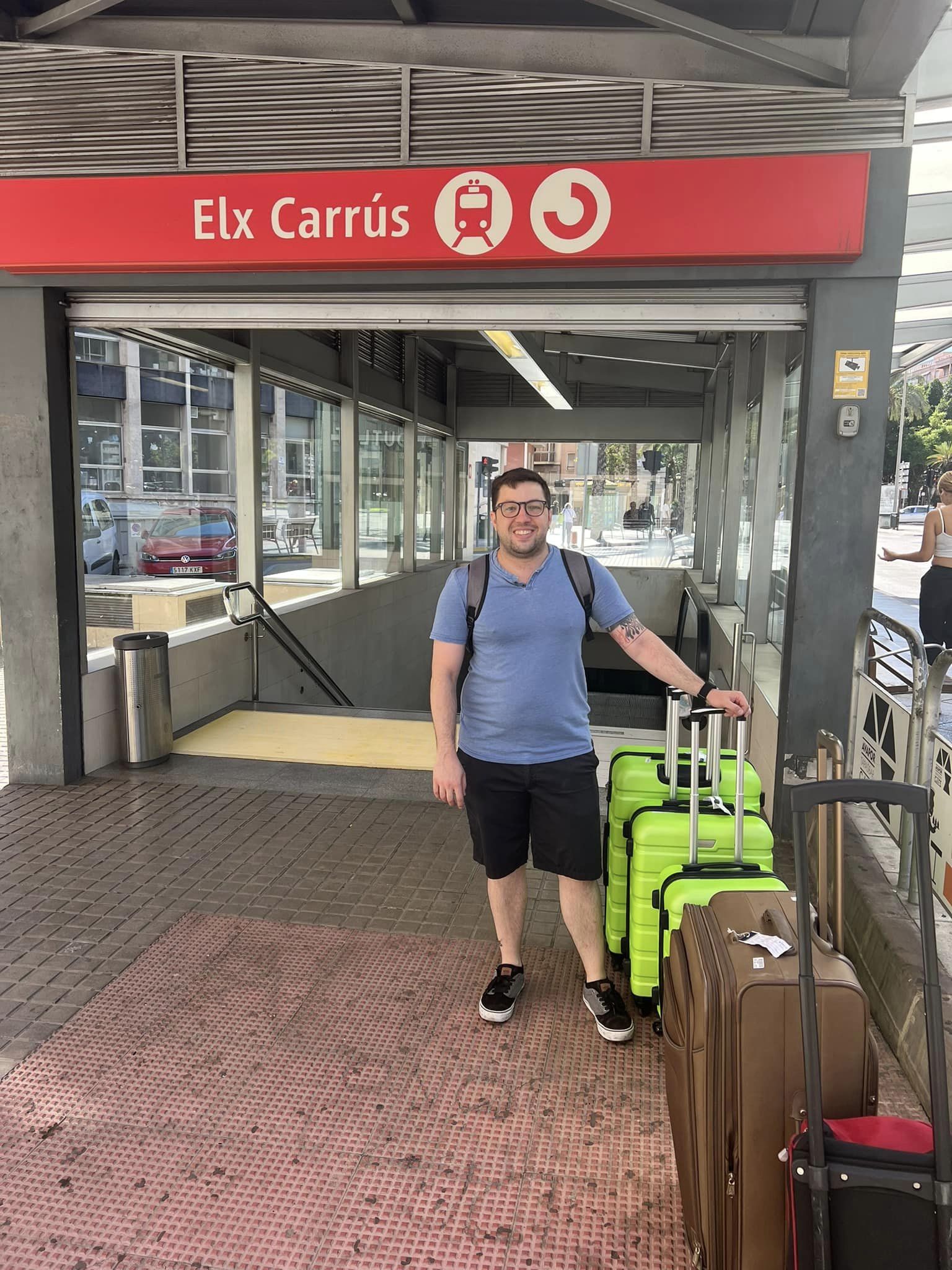ASU's online Spanish program provides a path for student with vision impairment

The large Valencia sign welcomes visitors to Valencia, Spain, and the famous Hemisferic building in the City of Arts and Sciences.
Editor’s note: This story is part of a series of profiles of notable fall 2022 graduates.
This semester, in an effort to improve his fluency in Spanish, ASU graduating student Paul Mrstik taught in Elche, a community in Valencia, Spain, as part of the North American Language and Culture Assistants Program.
But before he got to where he is today, he changed the path of his studies at least three times at different institutions. He first studied American Sign Language with the goal of becoming an interpreter, then paralegal studies and law, and finally IT before settling on Spanish.
He had always loved languages but, like many, was under the impression that the only thing you can do with a Spanish degree is teach. Eventually, Mrstik realized that what is most important is to do what you love and have a knack for.
When he earned his associate’s degree in paralegal studies, Mrstik was living in Washington, D.C., a competitive market for the field. In the meantime, he fell back on his experience in customer service and secured a job at Starbucks, a company he was drawn to in part because of its College Achievement Program in partnership with Arizona State University. However, he wouldn’t be ready to embark on his studies again for another two years after a couple of setbacks, including the death of a close friend.
What eventually pushed him to take the next step was the extra time he had as a result of the pandemic. Thus, he embarked on his studies as a dual major in IT and Spanish with ASU Online.
While Mrstik continued to thrive in his Spanish classes, he found he didn’t have the same passion for calculus. During a conversation with his mom after a mid-semester breakdown, Mrstik discussed how he did not feel fulfilled with his studies in IT but was uncertain about pursuing Spanish as his sole major. Ultimately, it was his mom who gave him the encouragement to follow his heart, assuring him that a Spanish degree is a great choice especially if he was truly enjoying his classes and succeeding in them.
Not only has the Online Undergraduate Research Scholars (OURS) scholarship recipient overcome personal setbacks and embarked on a journey to discover where his passions truly lay — a right of passage for anyone — he has also worked hard on his coursework while facing vision loss. But, he doesn’t allow that to limit him. The ability to learn Spanish online has been a driving force behind his studies.
It is difficult for Mrstik to read papers, but the screen readers on computers facilitate him. “There are very few online language programs," he said. "The ones that are available are novel.”
Question: What’s something you learned while at ASU — in the classroom or otherwise — that surprised you or changed your perspective?
Answer: Something that has really changed my perspective is a course I am taking to learn research and what it means to be a researcher. I’m now really interested in research and thinking about how to approach things. It has been challenging and rewarding because it has required international collaboration with my project partners, who live in Hawaii and Florida. It has also pushed me further than any other class and has really shown me what it means to do a PhD program.
Q: Why did you choose ASU?
A: I needed a job when I moved to Washington, D.C. I was looking for work as a paralegal; however, entering that job market is hard because there are retired lawyers working in most of those positions. I turned to my experience in customer service and applied with Starbucks since it has the College Achievement Program with ASU. I’ve made some mistakes during my studies, and it was really encouraging to me that I was admitted to ASU despite that.
Q: Which professor has had the most impact during your time at ASU?
A: It’s really hard to choose one professor. I have learned the most from the class I am taking with Kristin Elwood, SLC/SPA 498 Technology-Enhanced Language Learning (Small Group Research), which is exclusive to ASU Online students. I am constantly being challenged in the course. She gives great feedback on assignments and challenges me to think like a researcher. Additionally, I would not be doing what I am today without Maria Jose Dominguez. She is the one who told me about the NALCAP program and encouraged me to apply. Last, Iliana Beaza-Lopez always encouraged me during my Spanish studies.
"People need to be more understanding, and when you study language and culture, you learn that skill." — Paul Mrstik
Q: What’s the best piece of advice you’d give to those still in school?
A: It’s okay to mess up. It’s going to happen. Just take your time and enjoy the journey because nobody is perfect.
I have had a few slip-ups and have even forgotten deadlines and went through a shame spiral after a professor gave me a zero. I had to pull up my bootstraps and tell myself that it was going to be okay. That one zero is only 10% of the grade and is not the end of the world.
Q: What are your plans after graduation?
A: I am currently losing my vision and am night blind, so I need to be in a place that doesn’t require a lot of vision. So far I think research is the best path since it involves a lot of computers, which are more friendly to visual impairments with screen readers. I’d like to get involved in research to improve curriculum development, specifically. My current research focuses on how to engage students in the classroom by using digital media — for example, watching native language programs on Netflix as part of the curriculum.
Q: If someone gave you $40 million to solve one problem on our planet, what would you tackle?
A: If I had $40 million to solve a problem on our planet, I would like to revamp language learning systems worldwide. People need to be more understanding, and when you study language and culture, you learn that skill. There are so many monolinguals around the world, especially in the United States. Learning another language teaches adaptability, cultural humility and would hopefully lead to more peace.
More Science and technology

Study reveals genetic insight into desert survival
The deserts of the American Southwest are home to the Mojave and Sonoran desert tortoises, two seemingly similar yet genetically…

Study reveals lasting effects of common weed killer on brain health
Environmental exposure to toxins in the air, water or certain chemicals can increase the risk of ill health effects, including to…

ASU grad to use science to get an edge on crime
Editor’s note: This story is part of a series of profiles of notable fall 2024 graduates.As a child growing up in Pinetop,…
